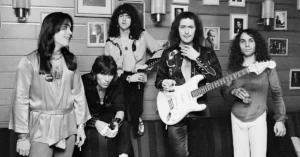Roxy Music: Glam Rock Visionaries and Architects of Art Rock
Roxy Music. Origins and Formation
Roxy Music emerged from the vibrant British music scene of the early 1970s, a time when rock was evolving rapidly in style and scope. The band was founded in 1970 in London by the charismatic and enigmatic Bryan Ferry, who served as the lead vocalist and principal songwriter. Ferry envisioned a band that would combine music with high art, fashion, and avant-garde aesthetics to create a unique cultural statement.

Joining Ferry were talented musicians who would shape Roxy Music’s groundbreaking sound:
- Brian Eno – synthesizers, tape effects, and treatments, bringing an experimental edge
- Andy Mackay – saxophone and oboe, adding a distinctive classical and jazz flavor
- Phil Manzanera – electric guitar, contributing innovative textures and riffs
- Paul Thompson – powerful and precise drums
- Graham Simpson – bass guitar (later replaced)
Together, this lineup merged diverse musical backgrounds and interests, from glam rock to experimental art music, forging a style that was both cutting-edge and accessible.
Roxy Music. Early Sound and Breakthrough
Roxy Music’s self-titled debut album, released in 1972, was a bold and sophisticated statement. It blended glam rock’s theatrical flair with avant-garde electronic experimentation. Songs like “Virginia Plain” and “Ladytron” showcased catchy melodies and Ferry’s suave vocal delivery, contrasted with Eno’s abstract soundscapes and unconventional synth effects. This combination was unprecedented, making Roxy Music stand out immediately.
The band’s early live performances were as much about fashion and visual spectacle as they were about the music, with Bryan Ferry’s sleek suits and stylized poses helping define their glamorous image.
Roxy Music. Artistic Expansion and Evolution
Roxy Music’s second album, For Your Pleasure (1973), marked a deepening of their artistic ambitions. The album featured complex arrangements and daring compositions such as “Do the Strand,” an energetic, rhythmic track that became a cult favorite despite its initial lack of commercial success. Brian Eno’s creative input peaked during this period, experimenting with tape loops and sound treatments, which added a mysterious and eerie atmosphere to the music.
After For Your Pleasure, Eno departed the band due to creative differences, seeking to pursue his solo career and production work. This departure was pivotal; while Eno’s avant-garde sensibility was a cornerstone of early Roxy Music, the band continued to evolve with new members like Eddie Jobson (keyboards, violin), who helped steer them toward a more polished and expansive sound.
Roxy Music. Mid-70s Success and Commercial Growth
With the arrival of guitarist Phil Manzanera and other new members, Roxy Music’s sound became richer and more accessible while maintaining its artistic integrity. Albums like:
- Stranded (1973)
- Country Life (1974)
showcased a balance of lush instrumentation, elegant songwriting, and sophisticated production. Songs such as “Street Life” and “All I Want Is You” highlighted their growing pop sensibility.
Their 1975 album Siren was their commercial breakthrough, featuring the hit single “Love Is the Drug.” This track combined funky basslines, catchy hooks, and seductive lyrics, reaching the Top 40 charts worldwide. Siren displayed Roxy Music’s ability to marry artful complexity with mainstream appeal.
Roxy Music. The 1980s and the Avalon Era
After experimenting with various styles in the late 1970s, Roxy Music entered a quieter phase, with Bryan Ferry pursuing a solo career marked by crooner-style pop and jazz influences.
In 1982, the band reunited to release Avalon, widely regarded as their magnum opus. This album embraced a smooth, atmospheric sound that combined elements of sophisti-pop, ambient music, and soft rock. Tracks like:
- “More Than This”
- “Avalon”
- “Slave to Love”
became defining songs of the era, notable for their ethereal production, lush synthesizers, and Ferry’s matured, emotive vocals.
Avalon received critical acclaim and commercial success, hitting the Top 10 in multiple countries and solidifying Roxy Music’s legacy as pioneers who could evolve with the times while retaining their artistic identity.
Influence and Legacy
Roxy Music’s impact on music and culture is vast and multifaceted:
- They were forerunners of glam rock, influencing contemporaries like David Bowie, T. Rex, and Queen.
- Their integration of art and fashion into rock performance helped redefine how bands presented themselves visually and conceptually.
- The band’s sophisticated fusion of rock, pop, jazz, and electronic elements paved the way for new wave, synth-pop, and sophisti-pop genres.
- Brian Eno’s time with the band was crucial to his development into a legendary ambient music pioneer and producer for artists such as U2, Talking Heads, and Coldplay.
- Bands like Duran Duran, Japan, Prefab Sprout, and Talking Heads have cited Roxy Music as a major influence.
- The band’s emphasis on artistic experimentation in popular music helped blur the boundaries between commercial success and avant-garde artistry.
Interesting Facts
- The iconic album covers, often featuring glamorous models like Jerry Hall and Amanda Lear, became a hallmark of Roxy Music’s brand, intertwining music and high fashion.
- Bryan Ferry’s voice is frequently praised for its smooth, crooning style combined with emotional intensity, making him one of rock’s most distinctive singers.
- Despite their glamorous image, Roxy Music’s music contains elements of melancholy, irony, and sophistication that set them apart from typical pop acts.
- The band was inducted into the Rock and Roll Hall of Fame in 2019, recognizing their lasting influence on music and culture.
- Bryan Ferry continues to have a solo career, admired for his interpretations of classic songs and his own elegant songwriting.
Select Discography
- Roxy Music (1972)
- For Your Pleasure (1973)
- Stranded (1973)
- Country Life (1974)
- Siren (1975)
- Manifesto (1979)
- Flesh + Blood (1980)
- Avalon (1982)
Roxy Music’s journey is one of constant reinvention, blending style, innovation, and artistry. From their glam rock roots through art rock experimentation to their sophisticated 80s resurgence, they remain one of rock’s most influential and stylish bands.






